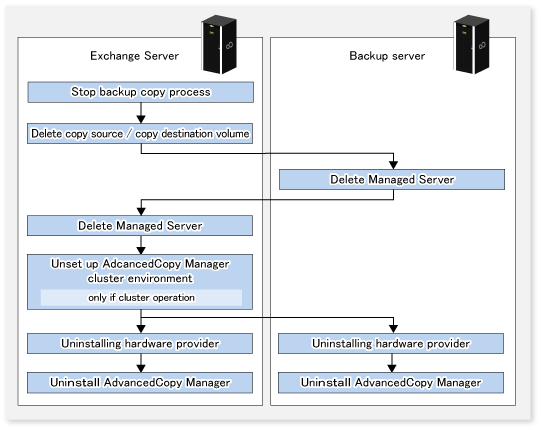This section describes how to perform uninstallation.
The following figure shows the flow of uninstallation tasks.
Figure 7.53 Uninstallation task flow

On the Exchange server, check the copy status using the VSSHP "Backup status lookup command (stxvquery). If any copy process is still executing, stop it using the VSSHP "Backup control command (stxvcopy)" or the VSSHP "Batch stop command (stxvstopall)" command.
Delete the source and replica volumes that have been set up.
Refer to swsrpdelvol (Replica volume information deletion command) for information on how to delete the source and replica volumes.
Alternatively, if the source or replica volume will no longer be used, initialize the disk. Refer to "7.2.6.4 Initializing a disk" for the procedure.
Delete the Managed Server to be uninstalled from the control of AdvancedCopy Manager.
The process of deleting a Managed Server can be carried out using either Web Console or stgxfwcmdelsrv (Server information deletion command).
If the Exchange Server has a cluster configuration, delete the Managed Server transactions and the Management Server transactions from the Exchange Server.
Refer to the "ETERNUS SF Cluster Environment Setup Guide" for more information about cancelling cluster settings.
If VSSHP will no longer be used, refer to "VSSHP Uninstallation" in the "ETERNUS VSS Hardware Provider User's Guide" and uninstall the VSSHP on both the Exchange server and the backup server.
Note
Do not uninstall VSSHP if there are other storage groups on the backup or Exchange servers where operations may use this hardware provider registration.
Refer to "Uninstalling ETERNUS SF Manager" and "Uninstalling AdvancedCopy Manager's agent" in the "ETERNUS SF Installation and Setup Guide" to delete AdvancedCopy Manager.